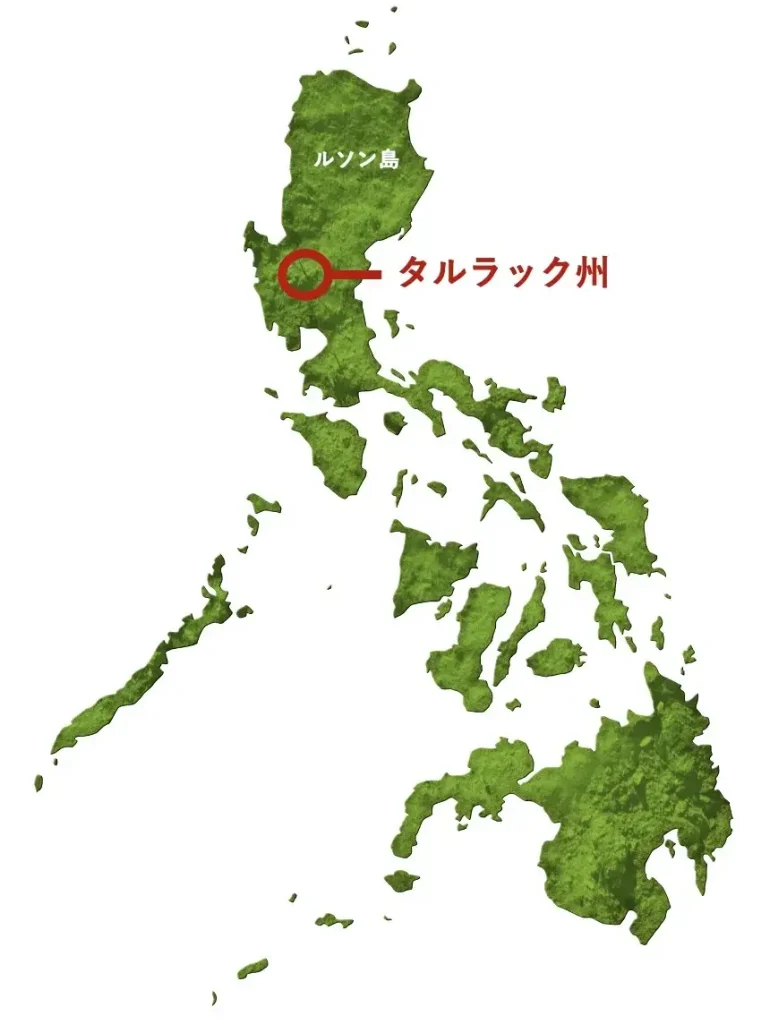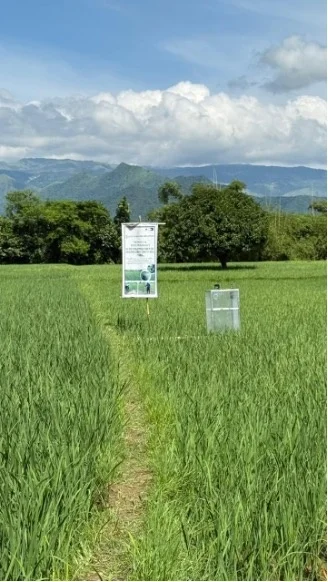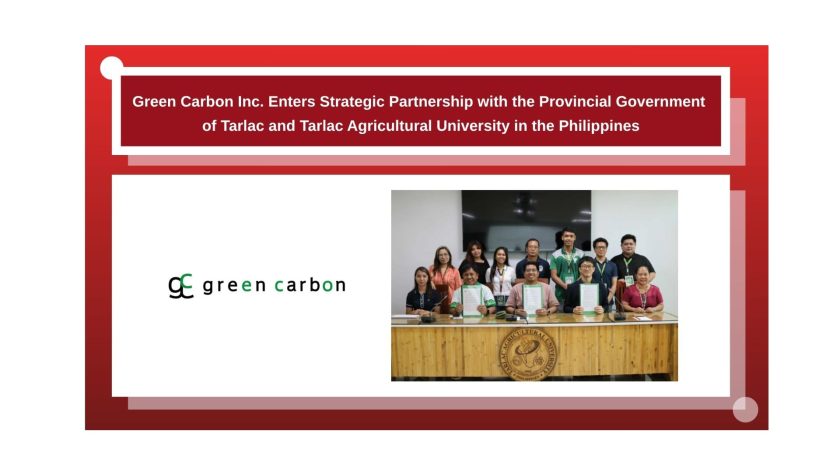~Aiming to reduce methane emissions from rice cultivation and promote sustainable agricultural practices across the region~
Green Carbon Inc. (CEO: Jun Okita; hereinafter “Green Carbon”), a company engaged in the development and sale of nature-based carbon credits, is pleased to announce that it has entered into a strategic partnership with the Provincial Government of Tarlac and Tarlac Agricultural University (TAU) in the Republic of the Philippines.
Through these partnerships, Green Carbon aims to introduce Alternate Wetting and Drying (AWD) farming practices (※1) in Tarlac Province to reduce greenhouse gas (GHG) emissions and generate carbon credits. In collaboration with the Tarlac Provincial Government, Green Carbon will promote a large-scale AWD project covering approximately 60,000 hectares of rice paddies across the province. Under the agreement with TAU, which will remain effective for three years with project funding contributions, the company will support the dissemination of AWD practices among local farming communities.
〇For inquiries regarding this press release and for further details, please contact:
〇To download Green Carbon Co., Ltd.’s company profile, please visit:
◆ About the Partnership
Green Carbon has been developing nature-based carbon credit projects primarily across Southeast Asia, including initiatives in forest conservation, rice paddies, mangrove planting, cattle methane reduction, and biochar projects. The company designs projects tailored to each region’s natural resources and uses satellite data to identify suitable sites and monitor progress, ensuring efficient and transparent operations.
In the Philippines, Green Carbon has been expanding its initiatives. The country’s agricultural sector emits approximately 54 million tons of GHGs annually (※2), of which rice paddies account for about 13 million tons—or roughly 25% of the agricultural total (※3). Addressing these emissions is an urgent challenge. Against this backdrop, since FY2023, Green Carbon has been collaborating with local research institutions to develop methane reduction projects for rice paddies using the AWD method.

〇Signing ceremony with Tarlac Agricultural University
◆ About Tarlac Province
Tarlac is one of the major rice-producing provinces in Central Luzon, Philippines. In 2024, the province recorded an annual rice production of 619,899 metric tons, with a harvested area of 140,687 hectares and an average yield of 4.41 tons per hectare (※4). In the first quarter of 2025, Tarlac accounted for 22.3% of Central Luzon’s total palay (unmilled rice) production of 808,600 metric tons (※5), making it a key agricultural hub in the region.
Rice cultivation in Tarlac is largely small-scale, with many farmers owning less than two hectares of land. While rice is cultivated in both wet and dry seasons, yields fluctuate seasonally. Furthermore, local soils face challenges such as phosphorus deficiency and acidity (※6), calling for the application of organic fertilizers and the incorporation of biomass such as rice straw.


〇Left: Location of Tarlac Province (red circle)/ Right: Rice fields in Tarlac
◆ About Tarlac Agricultural University (TAU)
Located in Camiling, Tarlac Province, TAU is a state university highly regarded for its programs in agriculture and environmental sciences. The university is dedicated to research, technology extension, and community engagement, actively contributing to sustainable development initiatives.
URL: https://www.tsu.edu.ph/
〇Official announcement (Facebook)
◆ Future Outlook
In Southeast Asia, Green Carbon is advancing diverse initiatives, and in the Philippines, it is focusing on JCM projects aimed at methane reduction in rice paddies through AWD implementation. Based on the methodology approved in early February 2025, the company is currently developing project structures.
In Japan, JCM credits have been approved for use under the GX-ETS (※7), allowing companies to apply them toward emissions exceeding their reporting limits. Demand for such credits is expected to increase further. Taking this into account, Green Carbon will continue working to ensure the economic viability of its projects while contributing to decarbonization efforts in both the Philippines and Japan.
Going forward, Green Carbon will collaborate closely with the Tarlac Provincial Government and TAU to promote and implement AWD practices among local farming communities, aiming to reduce methane emissions from rice cultivation and foster sustainable agricultural practices throughout the region.
(※1) Alternate Wetting and Drying (AWD):
AWD is a water management practice in which rice paddies are alternately flooded and allowed to dry for several days based on water level monitoring. Compared to continuous flooding, AWD reduces water usage and contributes to water resource conservation.
(※2) Annual GHG emissions from the Philippine agriculture sector:
Source: Department of Environment and Natural Resources (2023)
(※3) GHG emissions from rice production in the Philippines:
Source: Journal of Food, Agriculture and Environment (2016)
(※4) Rice production, harvested area, and average yield in Tarlac Province:
Source: PhilRice Ricelytics
(※5) Rice production in Tarlac Province, Q1 2025:
Source: Philippine Statistics Authority
(※6) Challenges in small-scale rice farming and soil conditions in Tarlac:
Source: Frontiers in Sustainable Food Systems (2021)
(※7) GX-ETS: Japan’s emissions trading scheme established under the government’s Growth-Oriented Carbon Pricing framework, allowing companies to trade emissions credits within capped limits.
◆ Green Carbon Inc.
Representative: Jun Okita, CEO
Head Office: PREX North 9F, 2-3-2 Kojimachi, Chiyoda-ku, Tokyo, Japan
Established: December 2019
Business Activities: Development and sales of carbon credits, agriculture-related projects, environmental projects, other related businesses, and ESG consulting
Website: https://green-carbon.co.jp/en/
◆ About Green Carbon
Guided by the vision of “Harnessing the power of life to save the Earth,” Green Carbon develops and supports projects that generate, register, and sell nature-based carbon credits both in Japan and abroad. The company is also engaged in agriculture-related businesses, R&D initiatives, and ESG consulting.
Its business activities span Japan, Southeast Asia, Australia, and South America, creating credits from rice paddies, biochar, forest conservation, carbon farming, mangrove planting, and cattle methane reduction. In Japan, Green Carbon obtained certification in FY2023 for the country’s first and one of the largest-scale rice paddy J-Credit projects (approx. 6,220 t). In FY2024, the company plans to expand this initiative to around 40,000 ha (approx. 80,000 t).
Green Carbon also provides “Agreen,” a one-stop platform service that streamlines the entire process of credit registration, application, and sales. By simplifying procedures and documentation, the service reduces the administrative burden on credit creators.

